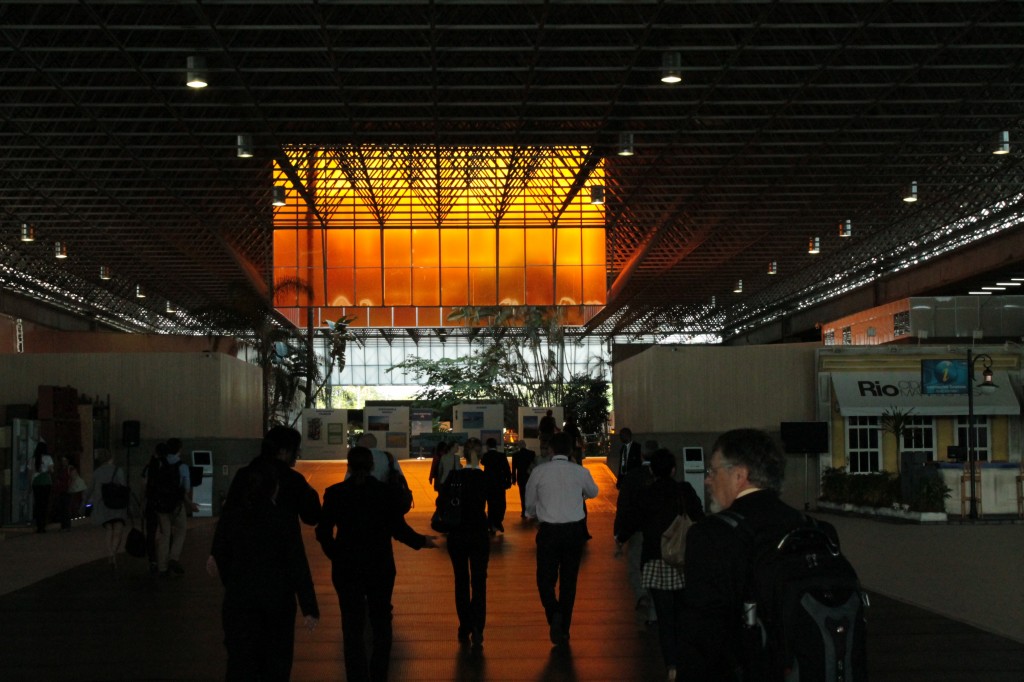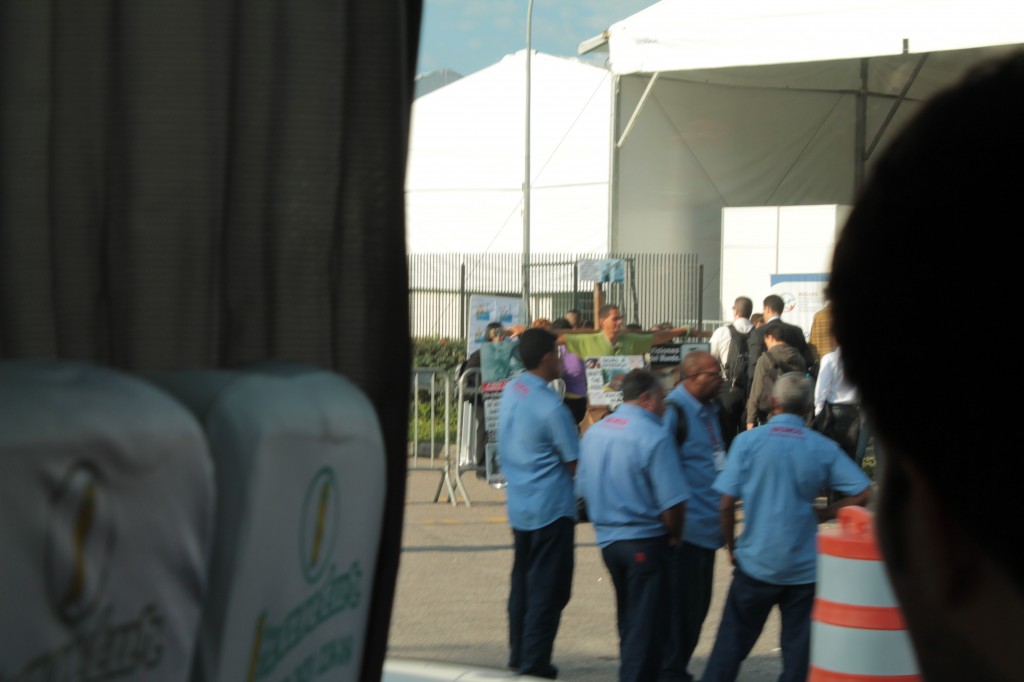by nathan thanki
For a "once in a generation" event, Rio+20 felt an awful lot like déjà-vu all over again. For those of us [dumb][nerdy][naïve][brave] enough to enter the lion's den of global multilateralism at the UN, the fact that governments could have ended last week’s “third Preparatory Committee to the Conference on Sustainable Development” (the pre-game to the big show) without ever having technically started it is not a shock. In international environmental diplomacy, the bar isn't just set low; we've buried it.
Negotiations took place round the clock in an attempt to have a final outcome document—a face saving political win—ready for world leaders to sign and congratulate themselves on.
Initially there were some bumps. Indeed, the road to Rio itself was downright perilous, with every preparatory meeting running into road blocks. Even last week, an awkward situation/potential media frenzy around the way in which observer states (i.e. Palestine) would participate held up the adaptation of the agenda for three full days. By the time the preparatory session closed 12.15am last Saturday morning, only 37% of the text— the quite ironically and insultingly labelled "The Future We Want"—had been agreed. They were aiming for 60%, minimum.
The official Conference on Sustainable Development (UNCSD) ran 20-22 June, and even though (or maybe because) Obama, Merkel and Cameron did not bother to grace us with their presence, the UN considered this an important event; an opportunity to restore faith in multilateralism and renew commitment to sustainable development and its three pillars—social, economic, and environmental. So it’s quite worrying for there to have been agreement on only 31% of the outcome so close to the start of the higher level plenary.
But as I said, it is not surprising. It's frankly nothing short of miraculous that there is agreement enough to meet in the first place. With such a spotlight on Rio though, a collapse in talks wouldn't do for the UN or the Brazilian government. Thus more “leadership” from…well…world “leaders” was needed. Brazil took on the role of circus master in order to bring together a “consolidated text” which was then discussed on the understanding that there would be no pernickety editing (no bracketing) allowed.
Although nobody came to Rio expecting much, and the atmosphere for most of the conference was undeniably flat, there is much to be indignant about. From the perspective of most of civil society (excluding, presumably, business and industry)—Rio+20 is an utter failure in ambition. As the much exalted heads of state worked through their tedious speeches, the frustration of the people came to the fore as hundreds of us gathered to symbolically reject the outcome. Putting faith in each other instead of our morally bankrupt leaders, we held a plenary in the face of UN security threats, and decided to stage a “walk out” of the conference to show that without civil society, there is no legitimacy to the process. The WTO or G20 would be even worse venues for these discussions, but at least there we would know that we are not going to be listened to or fully included. The entirety of civil society was not even granted a meagre 2 minute speaking slot on the final day of the conference.
Rio+20 was supposed to outline a common vision for the future. But that vision is a hollow lie. That vision is not based on our interests, or the interests of this planet that we all share. It is based on narrow self-interest of government and their corporate bedfellows. It is based on maintaining power and profit at all cost. The youth—whose only vested interest is our future, whose actions are not yet worn down by the diplomatic language and robotic interactions—know this. And we’re furious. It is the same fury you can see in Quebec, in Spain, in Egypt, in Chile, in Mexico. It says: the people who are supposed to represent us have failed. The old way isn’t working. We have a vision for a better world in which equity, empathy, inclusion, justice, love, dignity, and the rights of humans and nature prevail.
Over the past two weeks we saw clearly the most appalling betrayal of our future. And we have seen the most appalling betrayal of the past. All the promises and commitments made 20 years ago in this same city; what became of them? The developed world, rich as a result of years of exploiting their own and other’s natural resources in a predatory way, promised to acknowledge their responsibility and help the developing world with finance and technology. Those commitments have been reneged on, even as the brain drain of the South continues. New commitments are not forthcoming. The argument of the developed world—the EU, Canada, USA et al—is that they are broke (from bailing out their banks) and can’t afford to help. But they can afford $1 trillion for fossil fuel subsidies.
Sustainable development as a concept was defined and refined 20 years ago in Rio. Principles were established. Now, in 2012, all we have is a weak face-saving nod in their direction. Rather than calling this process Rio plus 20, we should call is what it is: Rio plus Zero. How could we not be furious?
UN liaisons constantly tell us to respect the process, to respect the system. But it is not a process that respects us. We are told that out voices are heard, for example in the tellingly uncreatively named “Sustainable Development dialogues,” a giant distraction from the heavy implication-laden discussions and political jostling that went on in the quiet chaos of the hyper-militarized, ultra-green washed and completely disconnected Rio Centro convention centre. But the voices of the people, many of which could be heard 2 hours away at the Cúpula dos Povos (People’s Summit), rarely make their way into the stuffy halls of the powerful.
For this disgusting lack of consideration and cooperation, and for the pathetic lack of ambition, “The Future We Want” is nothing like the future we really want.




